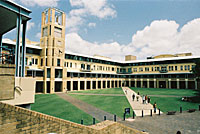| Information Systems & Mngt - INFSES8404 |
|
|||||||||||||||||||||||||
|
This Plan is no longer accepting new enrolments Plan Summary
This specialisation is no longer offered to commencing students. It has been superceded by the Information Systems specialisation.
The Information Systems and Management specialisation has three main focuses, Information Systems, Information Technology and Information Management. Information Systems and the supporting Information Technology are concerned with information systems analysis and design, data management, telecommunications, computer processing, electronic commerce, edp audit, management of information systems and applied expert systems within business and government. Information Systems and Information Technology are indispensable to the operations of most modern organisations. In an information systems course you will study how information systems are planned, analysed, designed, operated and managed. Throughout the program you will develop conceptual and practical skills of the way in which computer systems are used within organisations. Information Management is about how people create, seek, find, categorise, represent, evaluate, use and store information. Awareness of the importance of the knowledge and skills that information management involves has dramatically increased today because of the need to provide access to the vast, undigested, unwieldy bulk of information available on the Web and through the Internet. Information managers are the professional personnel who are transforming traditional organisations like libraries, museums, company and government archives. Graduates often follow careers as programmers, analysts, business analysts, information technology specialists, data administrators, EDP auditors, ecommerce specialists and Web managers. Major employers of Information Systems graduates include government departments, banks, finance organisations, oil companies, insurance companies, large manufacturing enterprises, retail companies, service industries, computer marketing organisations, universities and other research organisations. In order to qualify for the Information Systems and Management specialisation, in addition to core and elective courses students must complete at least six of the following courses:
Disciplinary Courses
Advanced Disciplinary Courses
Students with at least six completed advanced disciplinary courses shall have their advanced specialisation noted on their transcript.
Australian Computer Society (ACS)
The MCom in Information Systems and Management is one of the UNSW degree programs that is accredited to the level of Professional by the ACS. Basis for Accreditation
Conditions of Accreditation
The completed program is accredited as a whole program and the accreditation may not extend to when undertaken by students who are granted advanced standing, credit(s) or exemption(s) by the institution. A program undertaken by a student granted advanced standing, credit(s) or exemption(s) will only be regarded as the accredited program where, in the opinion of the Society, credit(s) or exemption(s) are given for equivalent courses(particularly in terms of Information Technology content) taken at an equivalent educational level in an institution of equivalent academic standing. Students seeking professional accreditation are advised to confirm requirements with ACS. Please refer to their website at: www.acs.org.au |
||||||||||||||||||||||||||

| Contacts | Library | myUNSW | WebCT |
